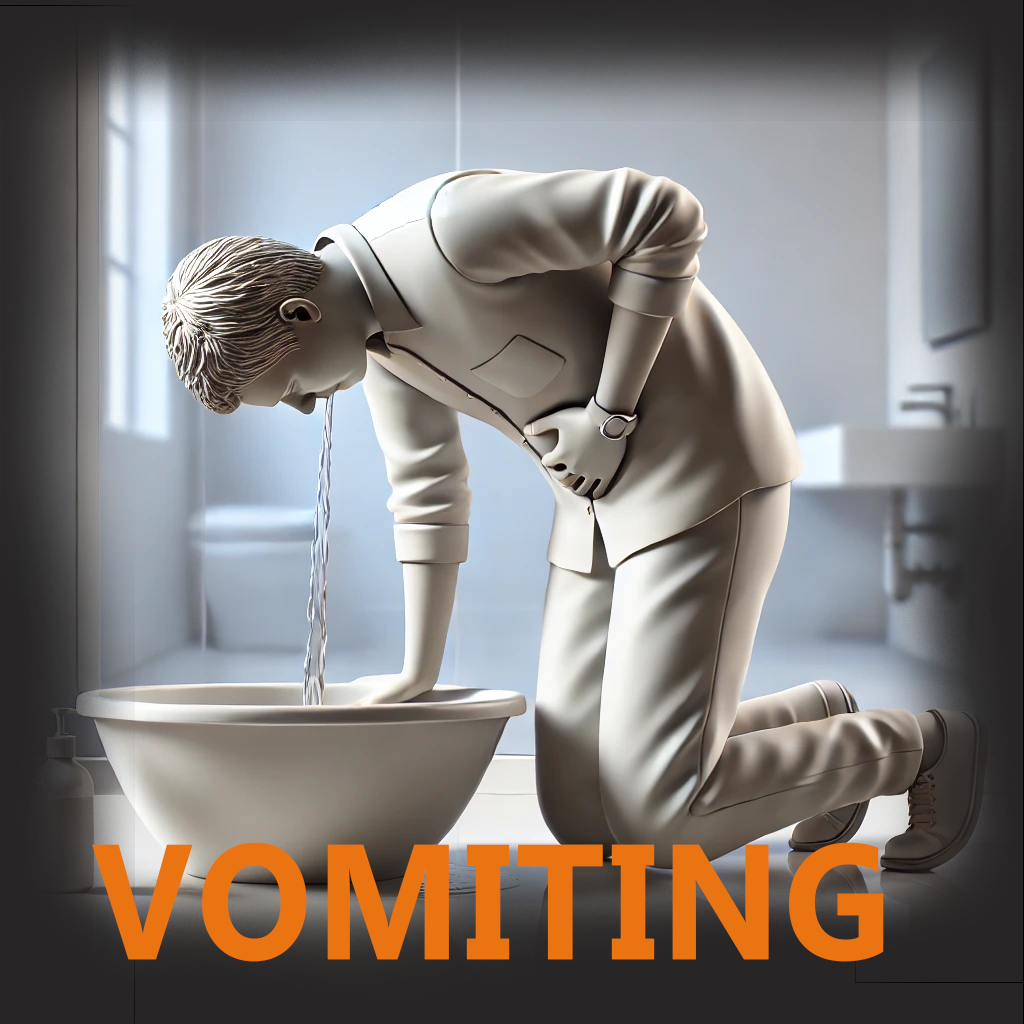What Causes Vomiting?
gagging and vomiting occurs to protect the body and is initiated by the brain’s vomiting center located in the medulla oblongata. There are many reasons that can cause vomiting and can be divided into:
1. Gastrointestinal Causes
- Food Poisoning: Eating contaminated food can cause foodborne illness, resulting in nausea and vomiting.
- Gastroenteritis: Inguinal or bacterial magma infections of the stomach lining, more usually known as stomach flu, often lead to vomiti.
- Blockages: Other conditions, such as bowel obstruction or pyloric stenosis in infants, can also cause persistent vomit.
- Acid Reflux or GERD: It can also cause vomit, in cases of chronic acid reflux.
2. Central Nervous System Causes
- Migraines: Some people vomit when they have very bad migraines.
- Motion Sickness: Disruption to the inner ear’s balancing mechanisms can cause nausea and vomit.
- Head Injury: p;0Increased intracranial pressure can also cause vomit from concussions or other head trauma.
- Brain Tumors: Persistent nausea and vomiting, especially in the morning, are suggested signs of a brain tumor.
3. Pregnancy
- Morning Sickness: Hormonal fluctuations that occur early in pregnancy make nausea and vomiting all the more prevalent during this time frame.
4. Medication and Toxins
- Side Effects of Medications: Some medications, such as chemotherapy drugs, can cause vomit.
- Substance Ingestion: Vomit may be caused by excessive alcohol consumption or accidental poisoning.
5. Other Causes
- Psychological Factors: Sometimes anxiety and stress cause vomit, too.
- Metabolic and Endocrine Disorders: Diabetic ketoacidosis or adrenal insufficiency can cause vomit.
- Infections: Systemic infections —such as urinary tract infections and sepsis— can likewise present with vomit.
Symptoms Accompanying Vomiting
Vomit is seldom a stand-alone symptom. It usually comes with other signs that may give you a clue to the cause. Other common associated symptoms include:
- Nausea: Vomit is usually preceded by a queasy feeling in the stomach.
- Abdominal Pain: It can signal gastrointestinal problems such as gastritis or appendicitis.
- Fever and Chills: These indicate an infectious process, such as gastroenteritis.
- Headache: This can be a sign of migraines or elevated intracranial pressure.
- Dizziness: Commonly linked to motion sickness or the feeling of vertigo.
Chronic or violent vomiting may cause dehydration, which presents with dry mouth, fatigue, scant urine output, and dizziness.
Diagnosing the Cause of Vomiting
Diagnosis of vomiting must include some information on its frequency, duration, and accompanying symptoms. Doctors might then use the following approaches:
- Medical History and Physical Examination: Questions about the patient’s most recent food intake, travel history, or use of medication help date and narrow down potential causes.
- Laboratory Tests: Blood tests can determine infections, metabolic imbalances, or organ dysfunction.
- Imaging Studies: A doctor might use X-rays, CT scans, or ultrasounds to look for obstructions or abnormalities in the digestive system or brain.
- Specialized Tests: In cases of continued or unexplained vomit; endoscopy or inner ear evaluations may be performed.
Treatment Options for Vomiting
Management of vomiting is directed towards the underlying cause and symptom relief. Here are the main methods:
1. Rehydration
Loss of fluid and electrolytes: Vomiting often causes loss of fluid and electrolytes. It is very important to replenish these, especially in children and in older people. The common recommendation is to use oral rehydration solutions (ORS). Severe cases may need intravenous fluids.
2. Medications
- Antiemetics: Shunt medications such as ondansetron, promethazine or metoclopramide may help control vomit.
- Antiviral or Antibiotic Therapy: If vomit search is due to infections.
- Proton Pump Inhibitors or Antacids: Also works for vomiting due to acid reflux.
3. Dietary Adjustments
-
After vomit, it’s advisable to begin with small sips of water or clear fluids. Slowly do (BRAT diet): Eat easy-to-digest and bland foods like bananas, rice, applesauce, and toast.
4. Addressing the Root Cause
-
Addressing underlying conditions — migraines, vertigo, hormonal imbalances, for example — will typically resolve vomit.
Complications of Prolonged Vomiting
Untreated frequent vomiting can lead to complications like:
- Dehydration: Severe loss of fluids can lead to imbalances of electrolytes and problems with the kidneys.
- Esophageal Tears: Severe vomit can cause a Mallory-Weiss tear, causing bleeding.
- Malnutrition: Chronic vomit disrupts nutrient absorption.
- Aspiration Pneumonia: Aspiration of vomit into the lungs can cause severe infections.
Preventing Vomiting
Prevention strategies vary based on the underlying cause but can include:
1. Lifestyle Modifications
- Dietary Care: Overeating eating rotten food, and eating too much fatty or spicy food is prohibited.
- Hydration: Hydrate to not get nausea due to dehydration.
- Limit Alcohol Consumption: Overindulgence in alcohol is a frequent cause of vomit.
2. Managing Motion Sickness
-
Take anti-nausea medications or acupressure bands when you travel.
-
If possible, avoid excess motion by choosing a seat toward the front of the car or airplane, for example.
3. Pregnancy Management
-
Small, frequent meals and staying away from triggers, including strong smells, can reduce morning sickness.
-
Most often, Vitamin B6 are recommended for pregnant women suffering from nau
4. Vaccination and Hygiene
-
Attending to rotavirus for children and good handwashing can help prevent infections that cause vomiting.
5. Regular Health Checkups
-
Monitoring chronic conditions like diabetes or GERD can help prevent vomits related to these diseases.
When to See a Doctor
Though occasional vomiting is generally benign, some warning signs warrant a call to a doctor right away:
-
Symptoms of dehydration such as decreased urination or confusion.
-
in vomit (hematemesis) or vomit that looks like coffee grounds.
-
Intense abdominal pain or fever with vomiting.
Conclusion
Vomit is a common symptom with many possible, from mild digestive upsets to life-threatening diseases.Timely identification of the underlying cause is crucial for effective treatment. Staying hydrated, managing stress, and practicing good hygiene will help to prevent bouts of vomit. If vomiting is frequent or extreme severity, seek medical help to correct that }

1 thought on “Vomiting: Causes,1 Symptoms, Treatment, and Prevention”